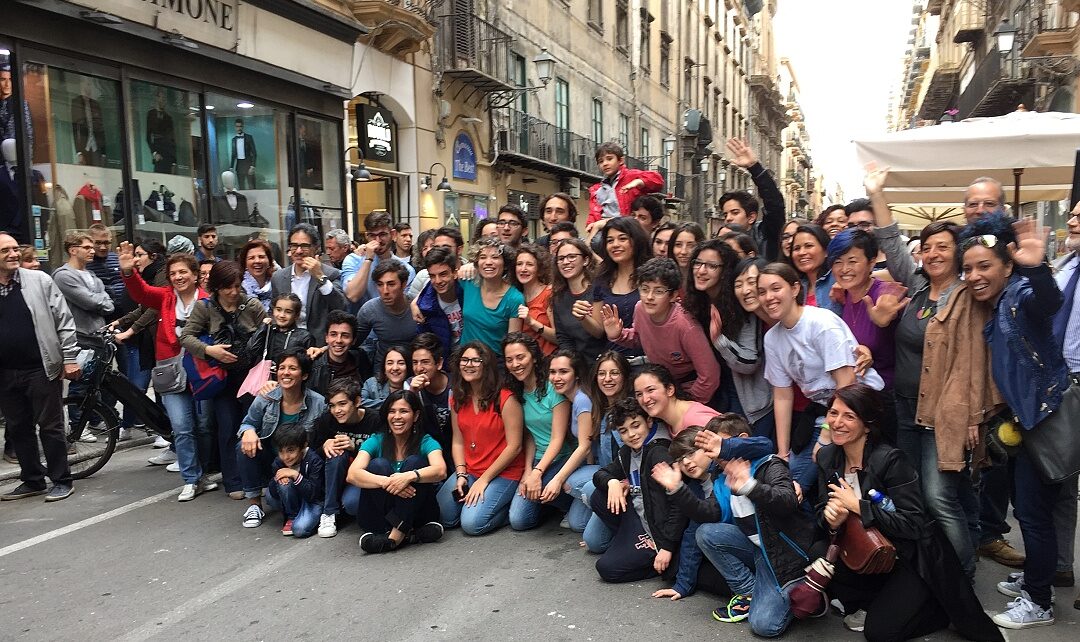
May 16, 2018 | Focolare Worldwide
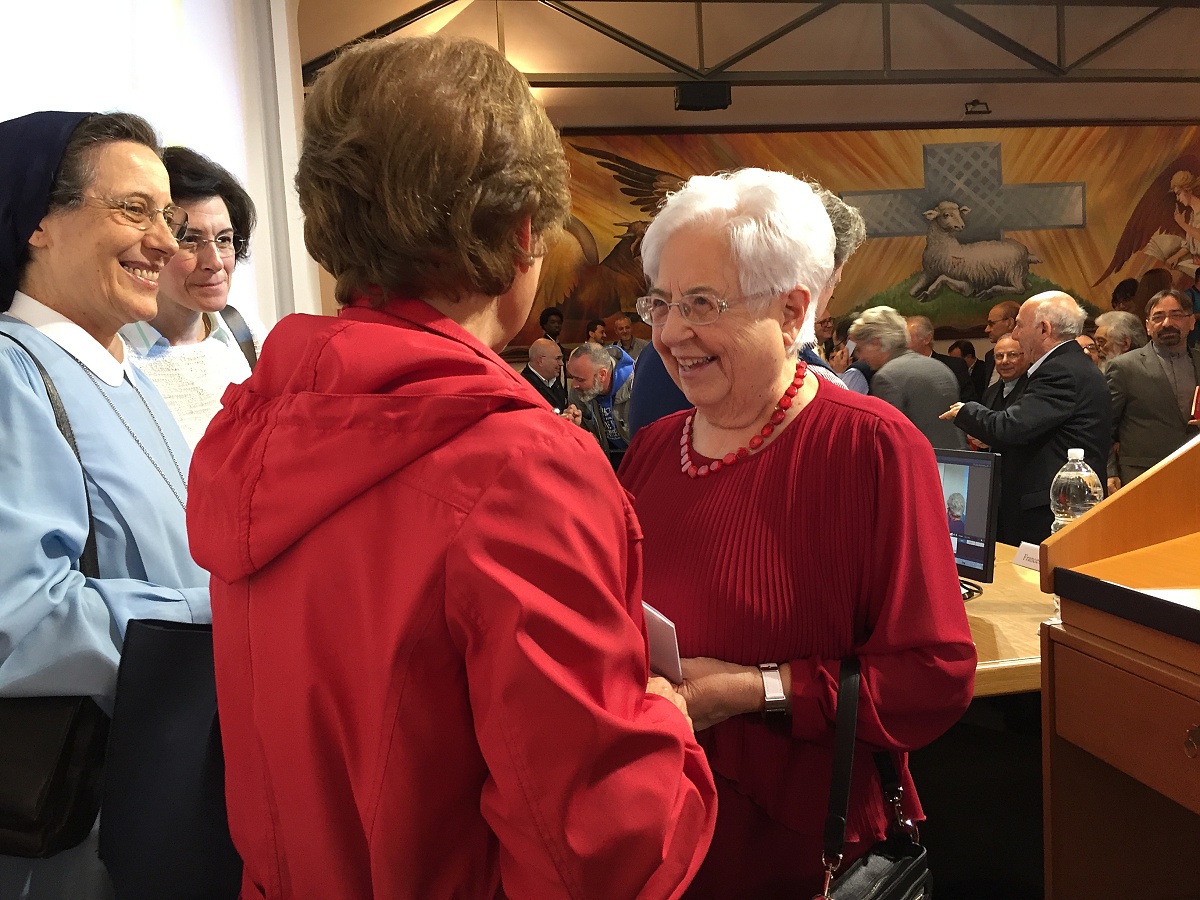 Focolare president, Maria Voce, concluded the event dedicated to the culture of unity and brotherhood, with a meeting of the family dedicated to the Focolare in the capital of Sicily, by offering a challenge: “That Palermo may become the capital of the culture of Resurrection, capital in the sense of “il capo”, (head city) from which the culture of Resurrection flows into the whole world.” Twenty years ago Chiara Lubich had received honorary citizenship in the Sicilian capital. Sincne then, the community has continued to follow this journey of striving to incarnate the words she spoke on that occasion: “Let us promise that Palermo will be forever in our hearts, until, through the audacity and courage of its citizens, it will become a model for many other cities within and beyond Italy, a true city on the hill.” The event, which was part of the Palermo, Capital of Culture 2018, promoted by the Municipality, embraced several fields: Law and Order, ecumenical dialogue, music and show with Gen Verde, workshops, flashmobs and roundtables promoted by the young people. More than 120 people took part in the Relationships and Law Meeting at the Regional Pariliament Building on May 11th. The gathering included presenations by several leaders from the world of Law and Justice, lawyers, students and scholars. Maria Voce concluded the discussions saying that the field Law and Justice is in extreme need of “poeple whose hearts are open to the grand ideal of the unity of the human family, and that for this reason put their whole self into working concretely for the healing of relationships, without fear or comprimise.”
Focolare president, Maria Voce, concluded the event dedicated to the culture of unity and brotherhood, with a meeting of the family dedicated to the Focolare in the capital of Sicily, by offering a challenge: “That Palermo may become the capital of the culture of Resurrection, capital in the sense of “il capo”, (head city) from which the culture of Resurrection flows into the whole world.” Twenty years ago Chiara Lubich had received honorary citizenship in the Sicilian capital. Sincne then, the community has continued to follow this journey of striving to incarnate the words she spoke on that occasion: “Let us promise that Palermo will be forever in our hearts, until, through the audacity and courage of its citizens, it will become a model for many other cities within and beyond Italy, a true city on the hill.” The event, which was part of the Palermo, Capital of Culture 2018, promoted by the Municipality, embraced several fields: Law and Order, ecumenical dialogue, music and show with Gen Verde, workshops, flashmobs and roundtables promoted by the young people. More than 120 people took part in the Relationships and Law Meeting at the Regional Pariliament Building on May 11th. The gathering included presenations by several leaders from the world of Law and Justice, lawyers, students and scholars. Maria Voce concluded the discussions saying that the field Law and Justice is in extreme need of “poeple whose hearts are open to the grand ideal of the unity of the human family, and that for this reason put their whole self into working concretely for the healing of relationships, without fear or comprimise.” 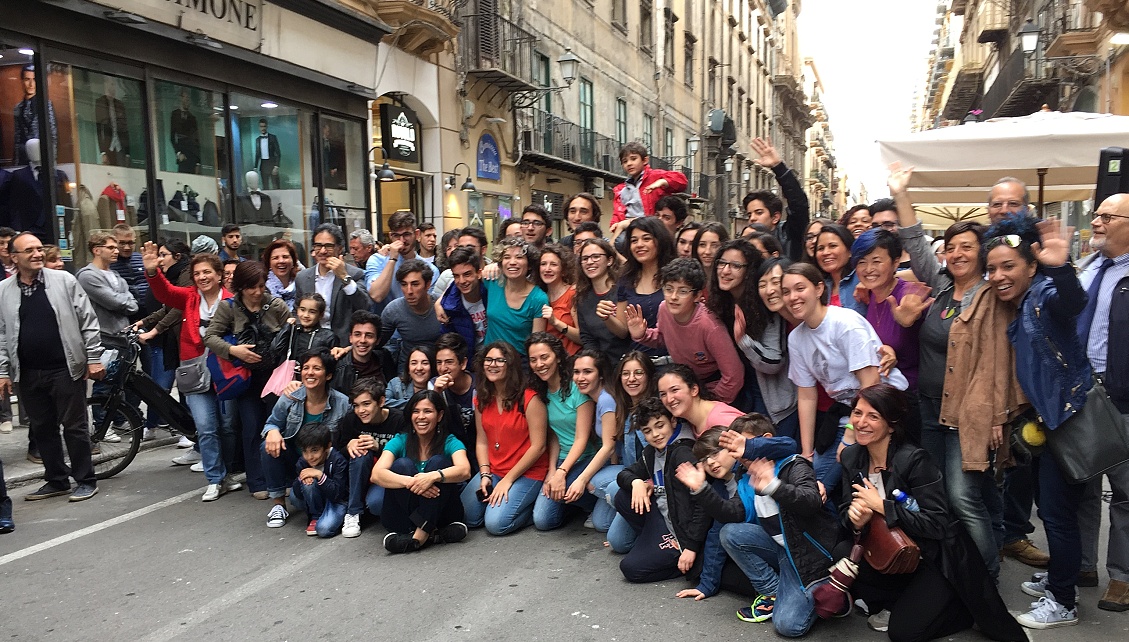 In the afternoon more than 300 young people held a programme on titled Digital Identity, promoted by IUS, and We are the choices we make” presented by Jesus Moran, co-president of the Focolare, and Mayor Leoluca Orlando. The young people presented testimonies of the choices that sometimes place them in crisis: whether to stay in Sicily or put their lives on the line and move to other cities or countries. Jesus Moran encouraged them to find the way to give of themselves. The choice falls back on “where can I give myself more and where can I develop my talents. […] Of I leave, I can’t just go to escape. If I stay, I can’t just stay our of fear.”Mayor Orlando stressed how difficult it can be to change a city that comes from years of submission to mafia rules and behaviors, and redeem oneself through a change of culture. In the morning of May 13th, there was a family moment at the celebration of the Mass, followed by a meeting for families in the historic neighbourhood of Albergheria/Ballaro with an artistic event for children. In the afternoon 500 representatives from more than 20 Christian Churches took part in Together in Charity, from Dialogue to Collaboration, at the Golden Theatre. The regional archbishop, Corrado Lorefice, Maria Voce and the director of the Director of the Regional Office for Ecumenism, Erina Ferlito made presentations. The testimonies described the journey begun by several cities of Sicily: from assisting prison inmates, to caring for the poor, the homeless and immigrants. Then there was the “On the Other Side” concert with Gen Verde and more than 800 people. In the preceding days there were exhibits by young people, workshops run by the band and a flashmob on one of the main thoroughfares of the city. This was also an overwhelming experience that excited by the youth and adults with the message of brotherhood that the international band brings around the world.
In the afternoon more than 300 young people held a programme on titled Digital Identity, promoted by IUS, and We are the choices we make” presented by Jesus Moran, co-president of the Focolare, and Mayor Leoluca Orlando. The young people presented testimonies of the choices that sometimes place them in crisis: whether to stay in Sicily or put their lives on the line and move to other cities or countries. Jesus Moran encouraged them to find the way to give of themselves. The choice falls back on “where can I give myself more and where can I develop my talents. […] Of I leave, I can’t just go to escape. If I stay, I can’t just stay our of fear.”Mayor Orlando stressed how difficult it can be to change a city that comes from years of submission to mafia rules and behaviors, and redeem oneself through a change of culture. In the morning of May 13th, there was a family moment at the celebration of the Mass, followed by a meeting for families in the historic neighbourhood of Albergheria/Ballaro with an artistic event for children. In the afternoon 500 representatives from more than 20 Christian Churches took part in Together in Charity, from Dialogue to Collaboration, at the Golden Theatre. The regional archbishop, Corrado Lorefice, Maria Voce and the director of the Director of the Regional Office for Ecumenism, Erina Ferlito made presentations. The testimonies described the journey begun by several cities of Sicily: from assisting prison inmates, to caring for the poor, the homeless and immigrants. Then there was the “On the Other Side” concert with Gen Verde and more than 800 people. In the preceding days there were exhibits by young people, workshops run by the band and a flashmob on one of the main thoroughfares of the city. This was also an overwhelming experience that excited by the youth and adults with the message of brotherhood that the international band brings around the world.
May 15, 2018 | Non categorizzato
The month of Ramadan started on 15 May and will end on 14 June. In this period of 29 or 30 days, the Muslims recall “the month in which the Koran was bestowed on mankind as a guide with clear teachings showing the Right way and a criterion of truth and falsehood” (Koran, Sura II, verse 185). During this period, prayers and acts of mercy are intensified. All those who are able shall fast from dawn to sunset, constituting the fourth of the five pillars of Islam. According to many theologians the spiritual meaning of fasts, together with prayer and meditation, sexual abstinence and renouncement in general, refer to the capacity of man to exercise self-control, patience and humbleness and remember to help the needy and less fortunate. Ramadan is thus a sort of exercise of purity against all the worldly passions, the benefits of which fall on the faithful all year long.
May 15, 2018 | Focolare Worldwide
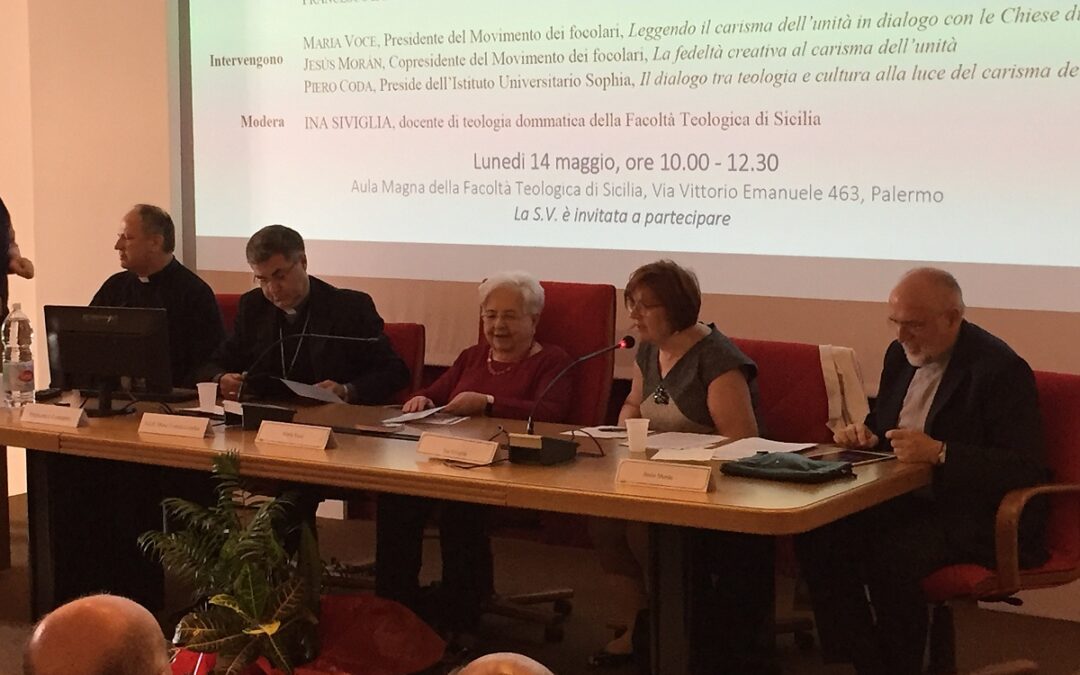
May 14, 2018 | Non categorizzato
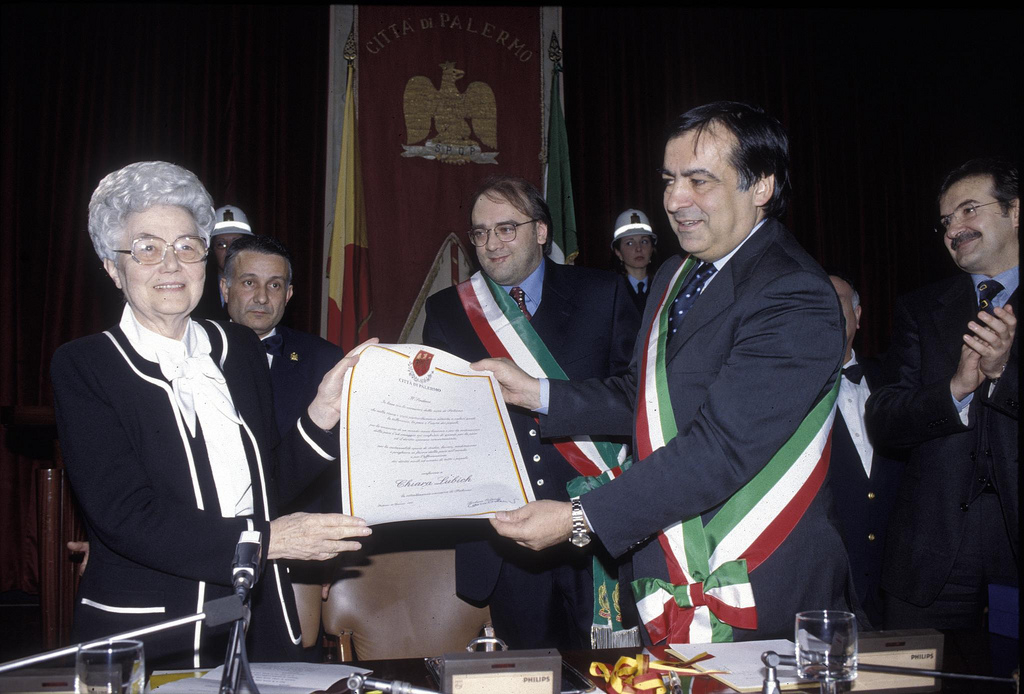
20 January 1998: Chiara Lubich is awarded the honorary citizenship of Palermo
 Maria Voce went on to say: “Chiara Lubich left an indelible mark with her efforts in favour of communion in the Church, for ecumenical dialogue and for brotherhood among peoples. As far back as the 1940s Chiara expressed her longing in words that were charged with zeal and urgency. “Look around: we’re all brothers [and sisters] – no one excluded!” This was how she exhorted us “to live out our universal brotherhood in one only Father: God who is in Heaven.” This was a plan that could be carried out in every city, but a plan that found particularly fertile ground in Palermo, a place “of encounter over the centuries among peoples, cultures and different civilizations,” a plan rooted in “the values of diversity, acceptance and solidarity.” What has this charism contributed to the Universal Church and to the individual Churches in Sicily and beyond? Maria Voce responded: “With the charism of unity, a “new way” has been opened in the Church,” a spirituality that is in perfect harmony with the Second Vatican Council. “From this spirituality of communion we have seen communion blossom within the Church among the different ecclesial Movements that enrich it, among the variety of ancient and modern charisms. We have seen how useful it is in contributing to the unity of Christians and opening dialogue with people of other religions, which represents one of the most urgent and challenging frontiers of the third millennium. And these are things that are also experienced at the level of the local Church.”
Maria Voce went on to say: “Chiara Lubich left an indelible mark with her efforts in favour of communion in the Church, for ecumenical dialogue and for brotherhood among peoples. As far back as the 1940s Chiara expressed her longing in words that were charged with zeal and urgency. “Look around: we’re all brothers [and sisters] – no one excluded!” This was how she exhorted us “to live out our universal brotherhood in one only Father: God who is in Heaven.” This was a plan that could be carried out in every city, but a plan that found particularly fertile ground in Palermo, a place “of encounter over the centuries among peoples, cultures and different civilizations,” a plan rooted in “the values of diversity, acceptance and solidarity.” What has this charism contributed to the Universal Church and to the individual Churches in Sicily and beyond? Maria Voce responded: “With the charism of unity, a “new way” has been opened in the Church,” a spirituality that is in perfect harmony with the Second Vatican Council. “From this spirituality of communion we have seen communion blossom within the Church among the different ecclesial Movements that enrich it, among the variety of ancient and modern charisms. We have seen how useful it is in contributing to the unity of Christians and opening dialogue with people of other religions, which represents one of the most urgent and challenging frontiers of the third millennium. And these are things that are also experienced at the level of the local Church.” 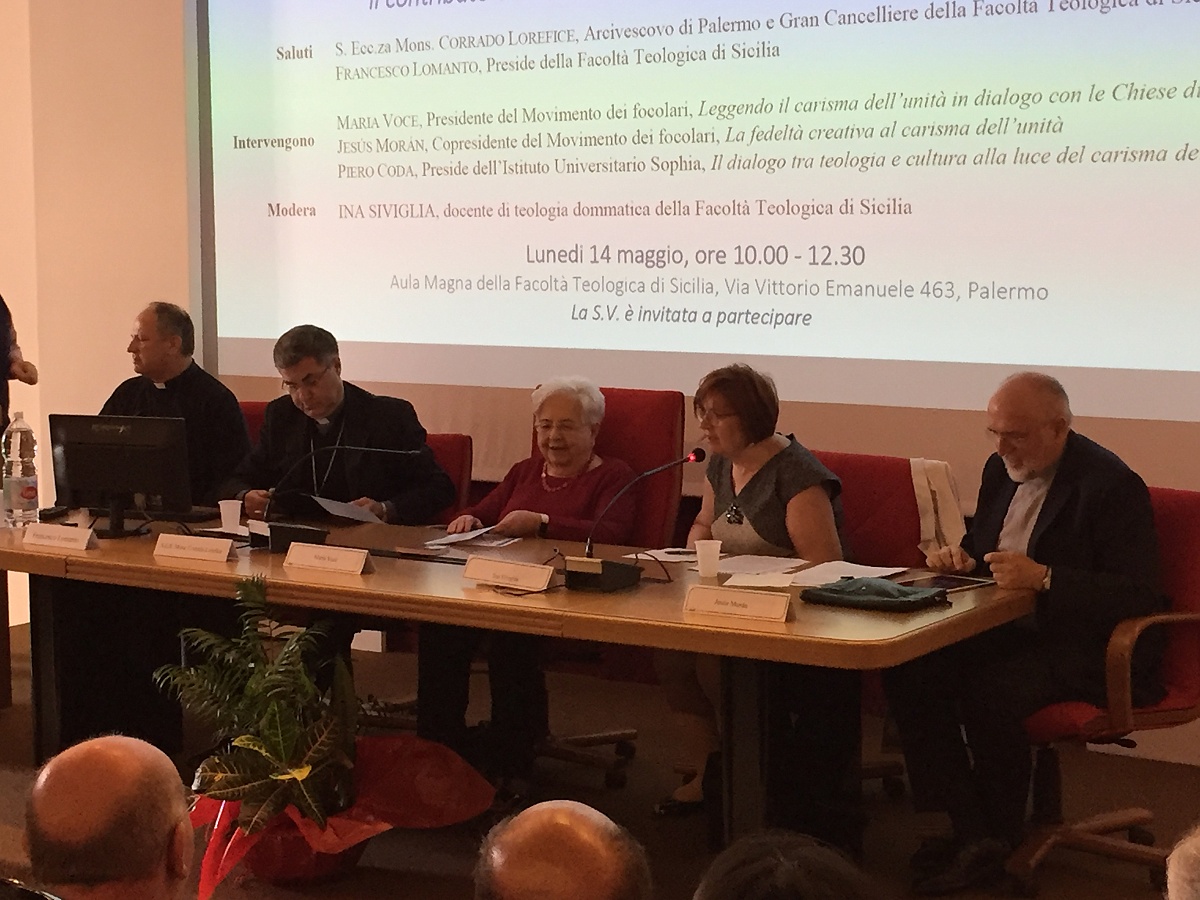 “Despite the many emergencies in recent years – indeed, because of them – the Movement in Sicily is deeply focused on witnessing to unity and building it among the members of the human family wherever that family may be threatened. This is the way they respond to Chiara’s appeal when she urges all of us to “build a new culture that would be a culture of human rights, a culture of law and order, a culture of love, a culture of life and never of death.” Maria Voce went on the say: “I think I can say something has already begun towards that goal. Certainly there is still a long road ahead, but it is a goal that with the entire Movement we renew today: to do our part at creating that ‘new civilization’ which contains all those values that are often trampled on . . . and to grow more and more – as Chiara says – all our Christian brothers and sisters, without leaving out the other religions, without leaving out anyone.” In so doing, we will truly be able to give life to a ‘culture of unity’ which Chiara more than once defined as the ‘culture of the Resurrection’.” Read full speech
“Despite the many emergencies in recent years – indeed, because of them – the Movement in Sicily is deeply focused on witnessing to unity and building it among the members of the human family wherever that family may be threatened. This is the way they respond to Chiara’s appeal when she urges all of us to “build a new culture that would be a culture of human rights, a culture of law and order, a culture of love, a culture of life and never of death.” Maria Voce went on the say: “I think I can say something has already begun towards that goal. Certainly there is still a long road ahead, but it is a goal that with the entire Movement we renew today: to do our part at creating that ‘new civilization’ which contains all those values that are often trampled on . . . and to grow more and more – as Chiara says – all our Christian brothers and sisters, without leaving out the other religions, without leaving out anyone.” In so doing, we will truly be able to give life to a ‘culture of unity’ which Chiara more than once defined as the ‘culture of the Resurrection’.” Read full speech

May 14, 2018 | Non categorizzato
 While preparations are underway for the 9th world meeting of families, to be held from 21 – 26 August 2018 in Dublin, Ireland, on the theme, “The Gospel of the Family: joy for the world,” the International Day of Families, instituted in 1994 by the United Nations General Assembly, will be celebrated on 15 May all over the world. Given the difficulties the family today encounters in carrying out its functions, we hope that the Day will serve to promote policies and actions in support of the family, recognizing its essential role as the “first cell” of society. “Saving the family,” wrote the politician and writer, Igino Giordani, considered by Chiara Lubich to be the cofounder of the Focolare Movement, “means saving civilization. The State is composed of families; if these degenerate, also the State falters.” And he continued: “The spouses become cooperators of God in giving life and love to humanity. Love which is from the family expands to the professions, the city, the nations and humanity.”
While preparations are underway for the 9th world meeting of families, to be held from 21 – 26 August 2018 in Dublin, Ireland, on the theme, “The Gospel of the Family: joy for the world,” the International Day of Families, instituted in 1994 by the United Nations General Assembly, will be celebrated on 15 May all over the world. Given the difficulties the family today encounters in carrying out its functions, we hope that the Day will serve to promote policies and actions in support of the family, recognizing its essential role as the “first cell” of society. “Saving the family,” wrote the politician and writer, Igino Giordani, considered by Chiara Lubich to be the cofounder of the Focolare Movement, “means saving civilization. The State is composed of families; if these degenerate, also the State falters.” And he continued: “The spouses become cooperators of God in giving life and love to humanity. Love which is from the family expands to the professions, the city, the nations and humanity.”
May 14, 2018 | Non categorizzato
A Conference will take place in Trent, Italy focusing on the Historical Roots and Intersection between Antonio Rosmini and Chiara Lubich. This event is promoted by the A. Rosmini Centre for Study & Research, University of Trent and by the Chiara Lubich Centre. It will have a two-fold aim: it will provide an opportunity to learn more about two great figures from Trent from the last two centuries; it will also help prepare in an original and unexpected way for the centenary of the birth of the foundress of the Focolare (1920 -2008.) The conference will take place on May 24 in the Specchi Hall in Casa Rosmini and on May 25 in the Conference Hall of the Caritro Foundation.
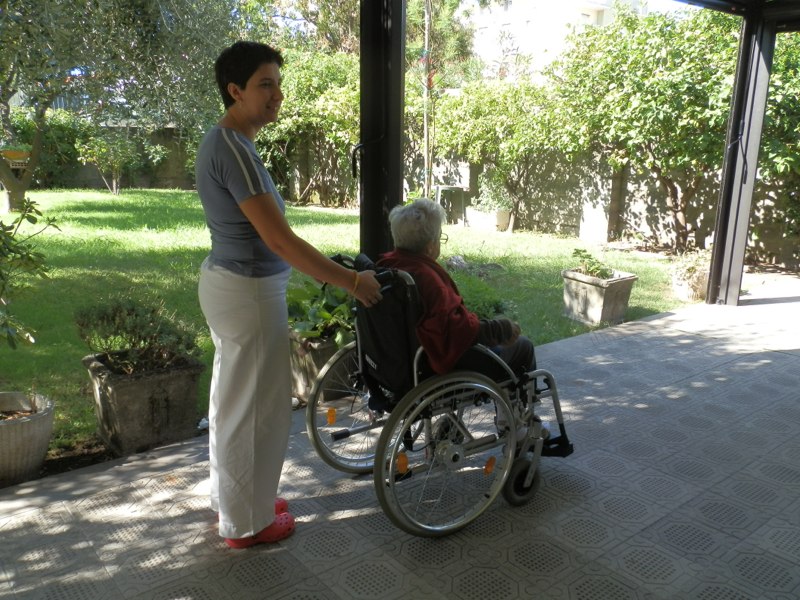
May 13, 2018 | Focolare Worldwide
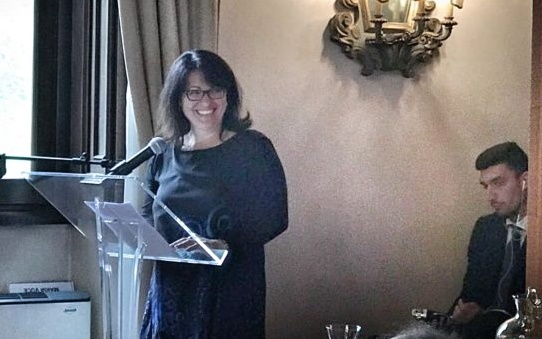 She lives and works in the province of Genoa, in a city of the North West, a very pleasant area between the sea and the mountains. Her role as president of one of the consortia of the social enterprise network with about seven hundred employees in the social service sector, welfare and job placement for disadvantaged people and regional representative of AIPEC (Italian Association of Entrepreneurs for an Economy of Communion) have in no way diminished her spontaneity and simplicity. Her testimony was closely listened to during a conference at the Italian Embassy in the Vatican, on May 3, 2018. The title of her talk was “Chiara Lubich and the Economy of Communion”: “I wanted to do a job that would be useful to others. As soon as I graduated, I won a public competition as an educator for the social integration of disabled children. I felt useful, but the job was paid by the hour and the contract was temporary. There were other girls in the same predicament as me, who had the same desire to develop themselves in the field of social service. One of them told the rest of us about some people who had been working in a cooperative for several years caring for disabled people. Meeting with them was definitive. They gave us a work space where we could work, dedicated time to us and offered their experience. That’s how our cooperative began, from a gift, from a gracious gesture that we embraced and then replicated. We later learned that that gesture was rooted in the Economy of Communion. This way of living that comes before the work, has marked and characterized the style of our own company.”
She lives and works in the province of Genoa, in a city of the North West, a very pleasant area between the sea and the mountains. Her role as president of one of the consortia of the social enterprise network with about seven hundred employees in the social service sector, welfare and job placement for disadvantaged people and regional representative of AIPEC (Italian Association of Entrepreneurs for an Economy of Communion) have in no way diminished her spontaneity and simplicity. Her testimony was closely listened to during a conference at the Italian Embassy in the Vatican, on May 3, 2018. The title of her talk was “Chiara Lubich and the Economy of Communion”: “I wanted to do a job that would be useful to others. As soon as I graduated, I won a public competition as an educator for the social integration of disabled children. I felt useful, but the job was paid by the hour and the contract was temporary. There were other girls in the same predicament as me, who had the same desire to develop themselves in the field of social service. One of them told the rest of us about some people who had been working in a cooperative for several years caring for disabled people. Meeting with them was definitive. They gave us a work space where we could work, dedicated time to us and offered their experience. That’s how our cooperative began, from a gift, from a gracious gesture that we embraced and then replicated. We later learned that that gesture was rooted in the Economy of Communion. This way of living that comes before the work, has marked and characterized the style of our own company.”
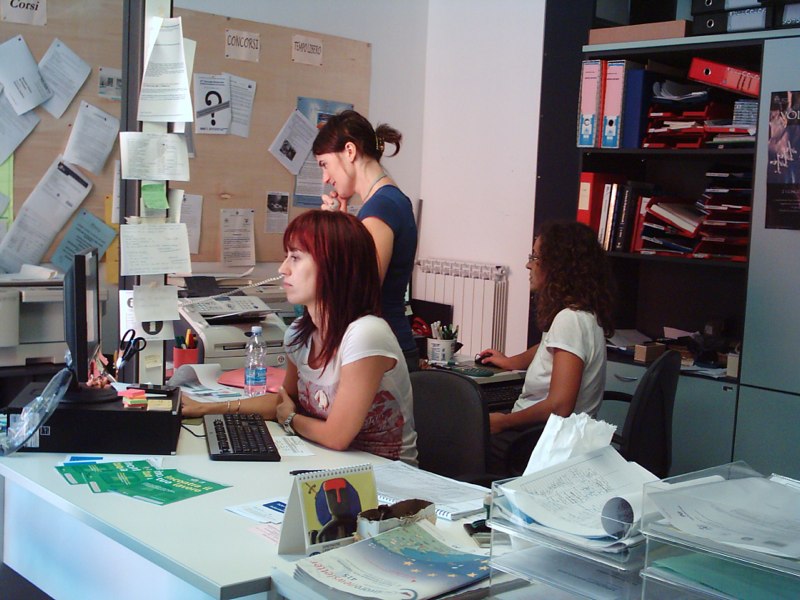
Photo © 2018 Il Sentiero di Arianna

© 2018 Il Sentiero di Arianna
May 12, 2018 | Non categorizzato
is a divine word. If this word were ever uttered by the Lord God, and people were to apply it to all its possible applications, we would see the world suddenly come to a halt, like a film, and start again in reverse. Countless people would on the wide path to perdition would turn around in their tracks, convert to God and take the narrow path. Families torn apart by quarrels, chilled by misunderstandings and scorn and deadened by divorce would get back together again. Children would be born into an atmosphere of human and divine love, and new men and women would be forged for a more Christian tomorrow. Factories often upheld by slaves and steeped in an atmosphere of boredom if not of blasphemy, would become places of peace where everybody did their job for the good of everyone. Schools would break beyond the limits of science, making all forms of knowledge footstools for eternal contemplation learnt at school through a daily unfolding of mysteries that could be intuited from small formulae, natural laws and even numerals . . . And the parliaments would be transformed into meeting places for people who are motivated not so much by each one’s positions, but by the common good, without any deceiving of lands or countrymen. In, we’d see the world become more good. Heaven would be wondrously poured out over the earth, and the harmony of creation would be a framework for the harmony of hearts. We’d see… What a dream! It seems a dream! And yet You didn’t ask for less when you prayed: “You will be done on earth as in Heaven”. Chiara Lubich Source: Chiara Lubich, L’unità, compiled by Donato Falmi and Floernce Gillet (Rome: Città Nuova, 2015), originally published in Chiara Lubich, Frammenti, (Rome: Città Nuova, 1963 and 1992), p. 53-54.
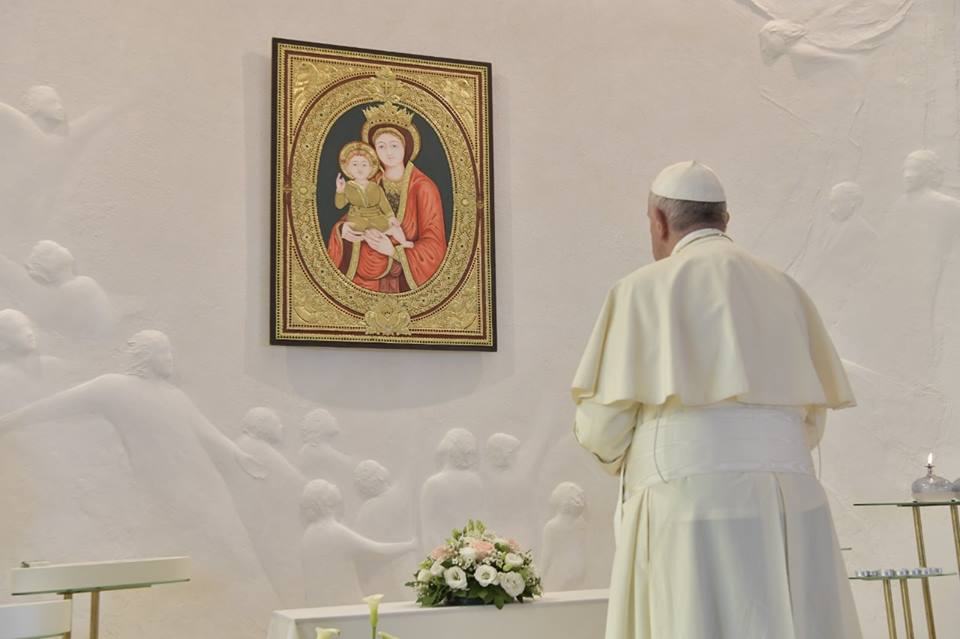
May 10, 2018 | Non categorizzato
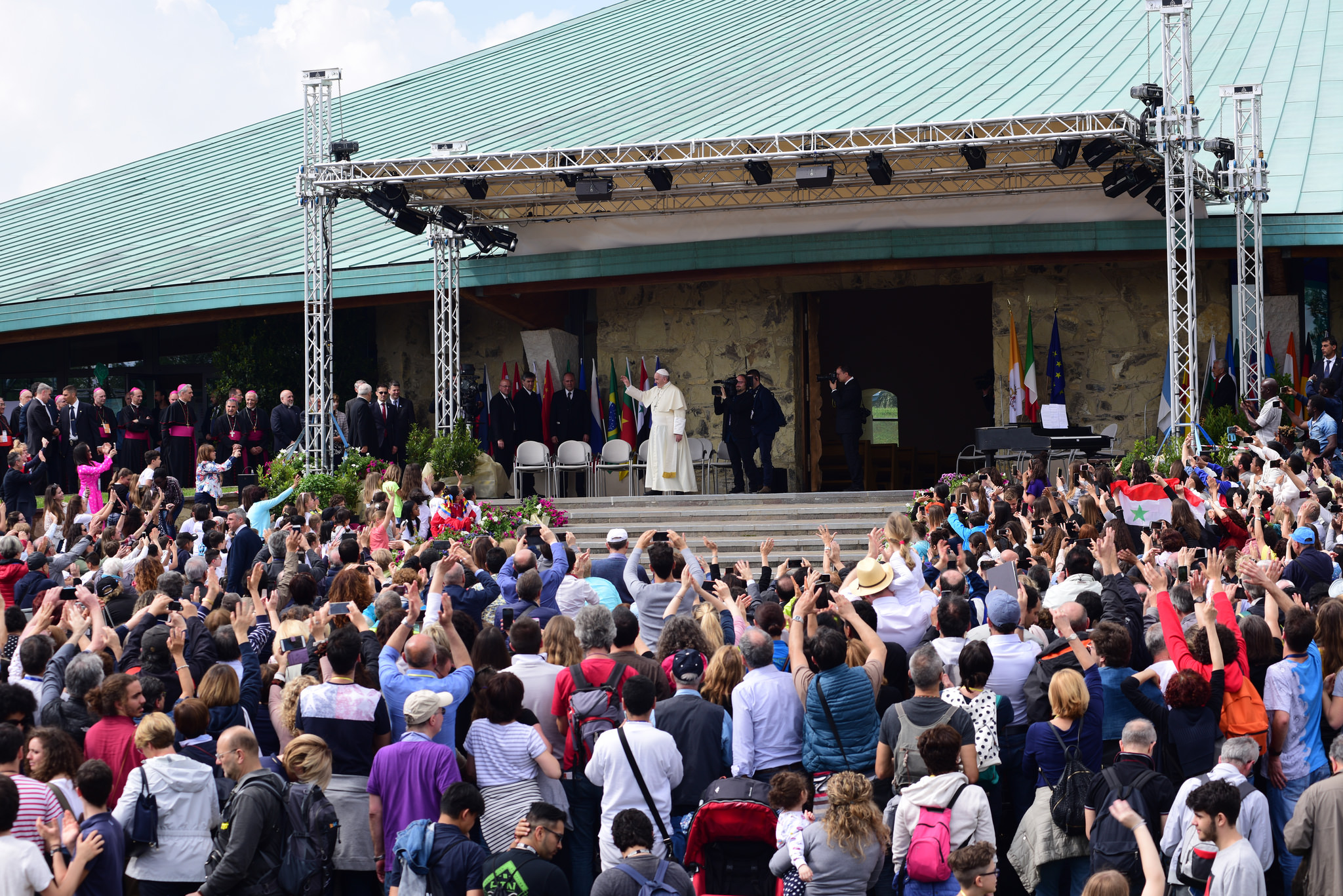
Foto © D. Salmaso – CSC Audiovisivi
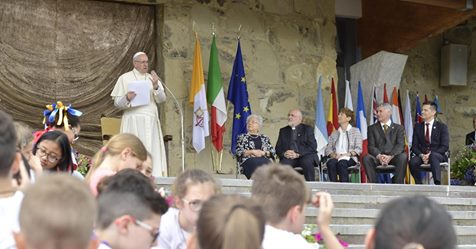
Foto © R. Bassolino – CSC Audiovisivi

Foto © R. Orefice – CSC Audiovisivi
Foto on Flickr 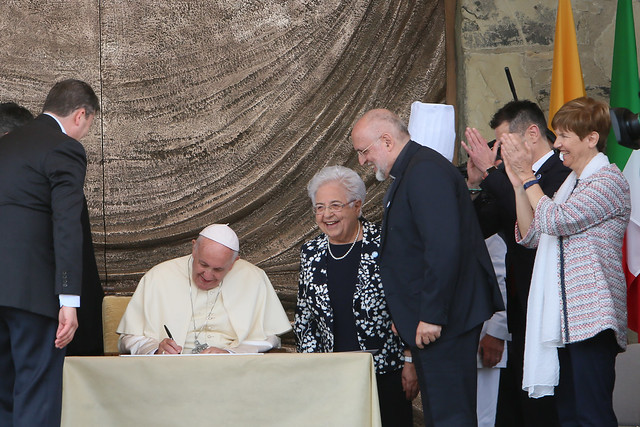

May 10, 2018 | Non categorizzato
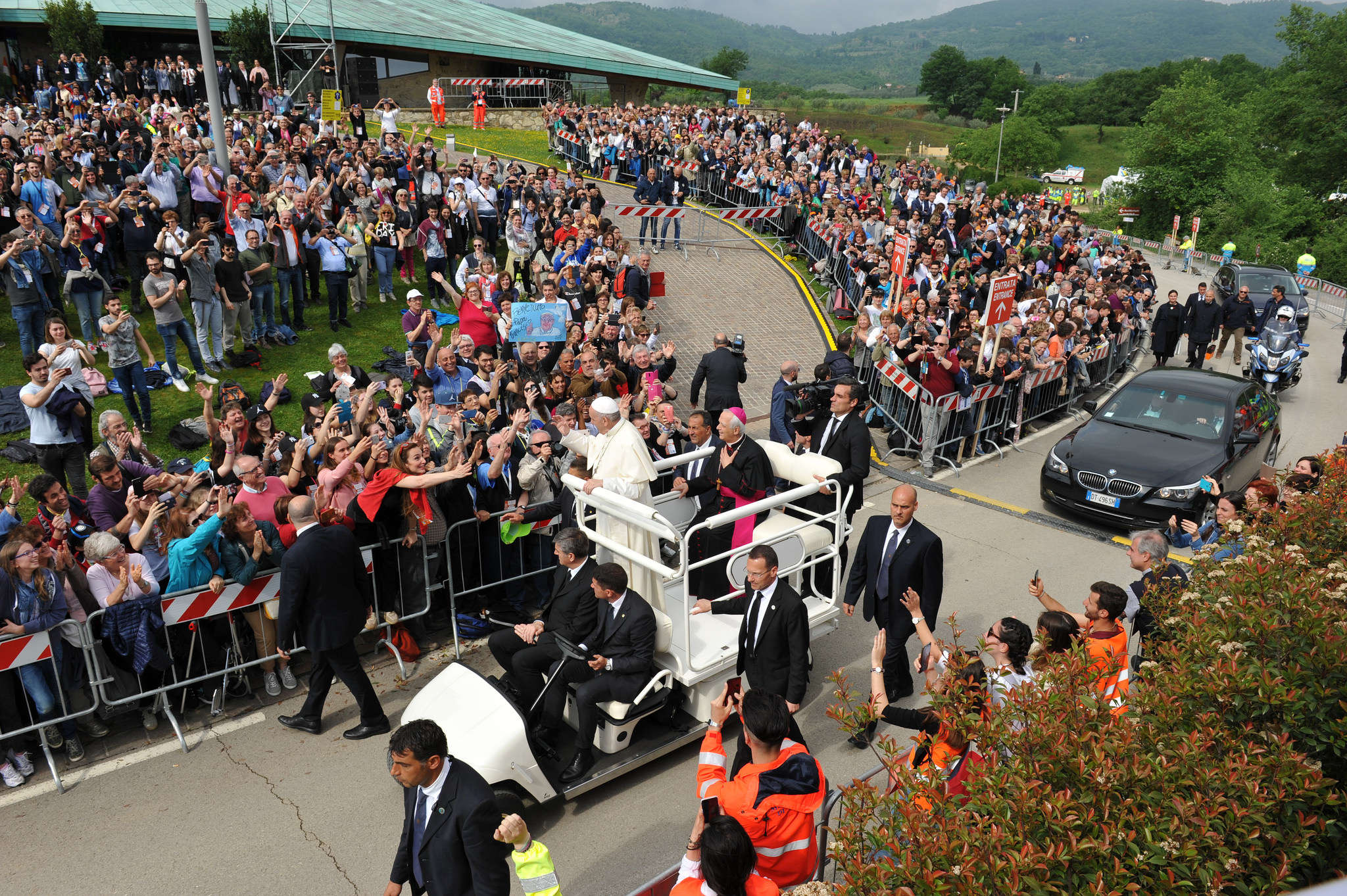
Photo credit © D. Salmaso – CSC Audiovisivi

Photo credit © R. Orefice – CSC Audiovisivi
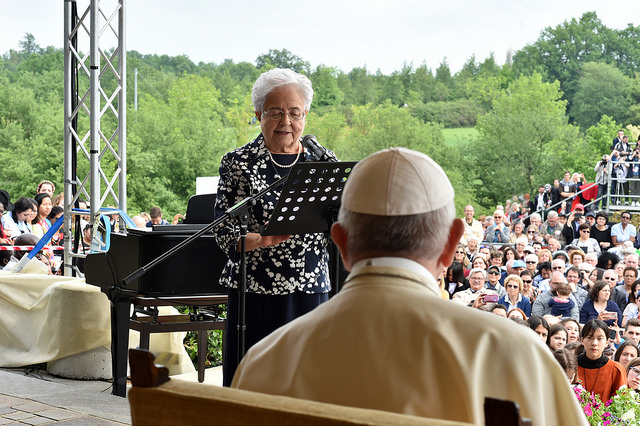
Photo credit © R. Orefice – CSC Audiovisivi


 Focolare president, Maria Voce, concluded the event dedicated to the culture of unity and brotherhood, with a meeting of the family dedicated to the Focolare in the capital of Sicily, by offering a challenge: “That Palermo may become the capital of the culture of Resurrection, capital in the sense of “il capo”, (head city) from which the culture of Resurrection flows into the whole world.” Twenty years ago Chiara Lubich had received honorary citizenship in the Sicilian capital. Sincne then, the community has continued to follow this journey of striving to incarnate the words she spoke on that occasion: “Let us promise that Palermo will be forever in our hearts, until, through the audacity and courage of its citizens, it will become a model for many other cities within and beyond Italy, a true city on the hill.” The event, which was part of the Palermo, Capital of Culture 2018, promoted by the Municipality, embraced several fields: Law and Order, ecumenical dialogue, music and show with Gen Verde, workshops, flashmobs and roundtables promoted by the young people. More than 120 people took part in the Relationships and Law Meeting at the Regional Pariliament Building on May 11th. The gathering included presenations by several leaders from the world of Law and Justice, lawyers, students and scholars. Maria Voce concluded the discussions saying that the field Law and Justice is in extreme need of “poeple whose hearts are open to the grand ideal of the unity of the human family, and that for this reason put their whole self into working concretely for the healing of relationships, without fear or comprimise.”
Focolare president, Maria Voce, concluded the event dedicated to the culture of unity and brotherhood, with a meeting of the family dedicated to the Focolare in the capital of Sicily, by offering a challenge: “That Palermo may become the capital of the culture of Resurrection, capital in the sense of “il capo”, (head city) from which the culture of Resurrection flows into the whole world.” Twenty years ago Chiara Lubich had received honorary citizenship in the Sicilian capital. Sincne then, the community has continued to follow this journey of striving to incarnate the words she spoke on that occasion: “Let us promise that Palermo will be forever in our hearts, until, through the audacity and courage of its citizens, it will become a model for many other cities within and beyond Italy, a true city on the hill.” The event, which was part of the Palermo, Capital of Culture 2018, promoted by the Municipality, embraced several fields: Law and Order, ecumenical dialogue, music and show with Gen Verde, workshops, flashmobs and roundtables promoted by the young people. More than 120 people took part in the Relationships and Law Meeting at the Regional Pariliament Building on May 11th. The gathering included presenations by several leaders from the world of Law and Justice, lawyers, students and scholars. Maria Voce concluded the discussions saying that the field Law and Justice is in extreme need of “poeple whose hearts are open to the grand ideal of the unity of the human family, and that for this reason put their whole self into working concretely for the healing of relationships, without fear or comprimise.”  In the afternoon more than 300 young people held a programme on titled Digital Identity, promoted by IUS, and We are the choices we make” presented by Jesus Moran, co-president of the Focolare, and Mayor Leoluca Orlando. The young people presented testimonies of the choices that sometimes place them in crisis: whether to stay in Sicily or put their lives on the line and move to other cities or countries. Jesus Moran encouraged them to find the way to give of themselves. The choice falls back on “where can I give myself more and where can I develop my talents. […] Of I leave, I can’t just go to escape. If I stay, I can’t just stay our of fear.”Mayor Orlando stressed how difficult it can be to change a city that comes from years of submission to mafia rules and behaviors, and redeem oneself through a change of culture. In the morning of May 13th, there was a family moment at the celebration of the Mass, followed by a meeting for families in the historic neighbourhood of Albergheria/Ballaro with an artistic event for children. In the afternoon 500 representatives from more than 20 Christian Churches took part in Together in Charity, from Dialogue to Collaboration, at the Golden Theatre. The regional archbishop, Corrado Lorefice, Maria Voce and the director of the Director of the Regional Office for Ecumenism, Erina Ferlito made presentations. The testimonies described the journey begun by several cities of Sicily: from assisting prison inmates, to caring for the poor, the homeless and immigrants. Then there was the “On the Other Side” concert with Gen Verde and more than 800 people. In the preceding days there were exhibits by young people, workshops run by the band and a flashmob on one of the main thoroughfares of the city. This was also an overwhelming experience that excited by the youth and adults with the message of brotherhood that the international band brings around the world.
In the afternoon more than 300 young people held a programme on titled Digital Identity, promoted by IUS, and We are the choices we make” presented by Jesus Moran, co-president of the Focolare, and Mayor Leoluca Orlando. The young people presented testimonies of the choices that sometimes place them in crisis: whether to stay in Sicily or put their lives on the line and move to other cities or countries. Jesus Moran encouraged them to find the way to give of themselves. The choice falls back on “where can I give myself more and where can I develop my talents. […] Of I leave, I can’t just go to escape. If I stay, I can’t just stay our of fear.”Mayor Orlando stressed how difficult it can be to change a city that comes from years of submission to mafia rules and behaviors, and redeem oneself through a change of culture. In the morning of May 13th, there was a family moment at the celebration of the Mass, followed by a meeting for families in the historic neighbourhood of Albergheria/Ballaro with an artistic event for children. In the afternoon 500 representatives from more than 20 Christian Churches took part in Together in Charity, from Dialogue to Collaboration, at the Golden Theatre. The regional archbishop, Corrado Lorefice, Maria Voce and the director of the Director of the Regional Office for Ecumenism, Erina Ferlito made presentations. The testimonies described the journey begun by several cities of Sicily: from assisting prison inmates, to caring for the poor, the homeless and immigrants. Then there was the “On the Other Side” concert with Gen Verde and more than 800 people. In the preceding days there were exhibits by young people, workshops run by the band and a flashmob on one of the main thoroughfares of the city. This was also an overwhelming experience that excited by the youth and adults with the message of brotherhood that the international band brings around the world.


 Maria Voce went on to say: “Chiara Lubich left an indelible mark with her efforts in favour of communion in the Church, for
Maria Voce went on to say: “Chiara Lubich left an indelible mark with her efforts in favour of communion in the Church, for  “Despite the many emergencies in recent years – indeed, because of them – the Movement in Sicily is deeply focused on witnessing to unity and building it among the members of the human family wherever that family may be threatened. This is the way they respond to Chiara’s appeal when she urges all of us to “build a new culture that would be a culture of human rights, a culture of law and order, a culture of love, a culture of life and never of death.” Maria Voce went on the say: “I think I can say something has already begun towards that goal. Certainly there is still a long road ahead, but it is a goal that with the entire Movement we renew today: to do our part at creating that ‘new civilization’ which contains all those values that are often trampled on . . . and to grow more and more – as Chiara says – all our Christian brothers and sisters, without leaving out the other religions, without leaving out anyone.” In so doing, we will truly be able to give life to a ‘culture of unity’ which Chiara more than once defined as the ‘culture of the Resurrection’.”
“Despite the many emergencies in recent years – indeed, because of them – the Movement in Sicily is deeply focused on witnessing to unity and building it among the members of the human family wherever that family may be threatened. This is the way they respond to Chiara’s appeal when she urges all of us to “build a new culture that would be a culture of human rights, a culture of law and order, a culture of love, a culture of life and never of death.” Maria Voce went on the say: “I think I can say something has already begun towards that goal. Certainly there is still a long road ahead, but it is a goal that with the entire Movement we renew today: to do our part at creating that ‘new civilization’ which contains all those values that are often trampled on . . . and to grow more and more – as Chiara says – all our Christian brothers and sisters, without leaving out the other religions, without leaving out anyone.” In so doing, we will truly be able to give life to a ‘culture of unity’ which Chiara more than once defined as the ‘culture of the Resurrection’.” 

 She lives and works in the province of Genoa, in a city of the North West, a very pleasant area between the sea and the mountains. Her role as president of one of the consortia of the social enterprise network with about seven hundred employees in the social service sector, welfare and job placement for disadvantaged people and regional representative of AIPEC (Italian Association of Entrepreneurs for an Economy of Communion) have in no way diminished her spontaneity and simplicity. Her testimony was closely listened to during a conference at the Italian Embassy in the Vatican, on May 3, 2018. The title of her talk was “
She lives and works in the province of Genoa, in a city of the North West, a very pleasant area between the sea and the mountains. Her role as president of one of the consortia of the social enterprise network with about seven hundred employees in the social service sector, welfare and job placement for disadvantaged people and regional representative of AIPEC (Italian Association of Entrepreneurs for an Economy of Communion) have in no way diminished her spontaneity and simplicity. Her testimony was closely listened to during a conference at the Italian Embassy in the Vatican, on May 3, 2018. The title of her talk was “






